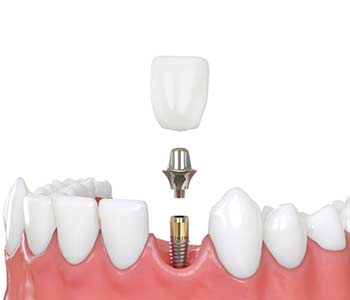
22
Mar
How long does it take to place dental implants? Dentist in Alpharetta discusses the tooth replacement process

Many patients want to know: “How long does it take to place dental implants in Alpharetta GA?” Dr. Bradley Hepler and the team at the Atlanta Center for Dental Health can’t say it too often; the actual placement of dental implants is an in-office procedure so uneventful that many patients return to work (or their usual activities) the very next day. Side effects are usually limited to modest tenderness and bruising, which typically subsides quickly. The procedure can be completed in a single appointment, and within minutes rather than hours. The specific amount of time required for each step in the process of getting dental implant-supported teeth depends on factors such as needs (the number of implants required) and the amount of bone present in the jaw.
While you may not get immediate gratification, know that after the procedure is complete, you’ll have dental implants for life with no more than the usual good oral hygiene at home and check-ups and cleanings at our office.
Consultation first, big smiles later
As with all procedures at the Atlanta Center for Dental Health, patients schedule a consultation at the Alpharetta office. During that time, Dr. Hepler examines your mouth and takes precision images of oral structures that can’t be seen with visual inspections alone. This helps to determine the type of tooth replacement that is best for you, and informs your treatment plan should you move forward with implants, as there are many different systems and approaches.
While systems differ, all implants are placed in the jawbone during an office procedure, well-tolerated with medication that numbs the area to be treated. Sedation is also available at our office for the utmost comfort and a pleasant experience. We’ll discuss this option during your consultation, which largely involves taking a sedative medication by mouth as directed by Dr. Hepler.
Other procedures can be performed at the time of implant placement or during a separate visit. Implants depend on bone in the jaw for support and, ultimately, for their long-term success. Since bone loss occurs quickly (as soon as a tooth is lost), hard tissue in the jaw may need to be built up with grafting. Sometimes bone grafting is so minor that it can be done at the same time your implant is placed. Other times, it may take time to grow sufficient bone to support the titanium post that is the implant and the crown or denture placed on top of it.
The idea with any implant is for the titanium alloy to join with the surrounding, supportive bone. Titanium is a biocompatible metal, which means that it is tissue-friendly, isn’t rejected by the body, and, in turn, is used in many types of prostheses, including for hip, knee, shoulder, and elbow joint replacement surgeries. The process of titanium and bone growing together is called “osseointegration.” This is by far the most time-consuming aspect of the implants process because natural tissue and medical-grade materials don’t grow together instantly. All implants should largely expect the following:
- As a replacement for your tooth’s root, the surgically-placed implant sits flush with bone but under gum tissue. So, the implant is protected from forces that can impede successful osseointegration.
- The process takes months. Dr. Hepler explains the anticipated timeframe, based off of your specific situation and needs.
- As the implant becomes bonded to the bone to becomes a part of you, your dentist advises on what to eat and care to promote successful, “on-schedule” osseointegration.
- Once Dr. Hepler confirms the implant has integrated properly, a post called an abutment is placed. Abutments act as connector pieces, through which implants are accessed to place prosthetic teeth – a single crown, or bridges and dentures.
- Today’s systems require minimal effort and investment for maximum gains; for instance, as little as four implants can replace all teeth in a dental arch.
After each stage of the implants process, soft foods may be recommended for 10 to 14 days to help treatment sites heal. After the final stage, the placement of the restored tooth or denture, it’s time to enjoy dental implants for a lifetime. Only minor adjustments may be needed as adjoining abutments loosen with use.
Since the implant-supported teeth are designed like natural teeth, they should be cared for like the teeth that developed with you, with routine visits to our office and good brushing and flossing at home. While restorations can’t decay like natural teeth, they are susceptible to gum disease-like inflammation, peri-implantitis, which causes implant failures. Well in advance of placement, Dr. Hepler discusses and addresses potential threats to implant success, such as tooth-grinding. Restorations can be protected with a custom-fitted dental appliance (nightguard).
Call (866) 687-1992 to schedule a consultation at the Atlanta Center for Dental Health in Alpharetta GA.
